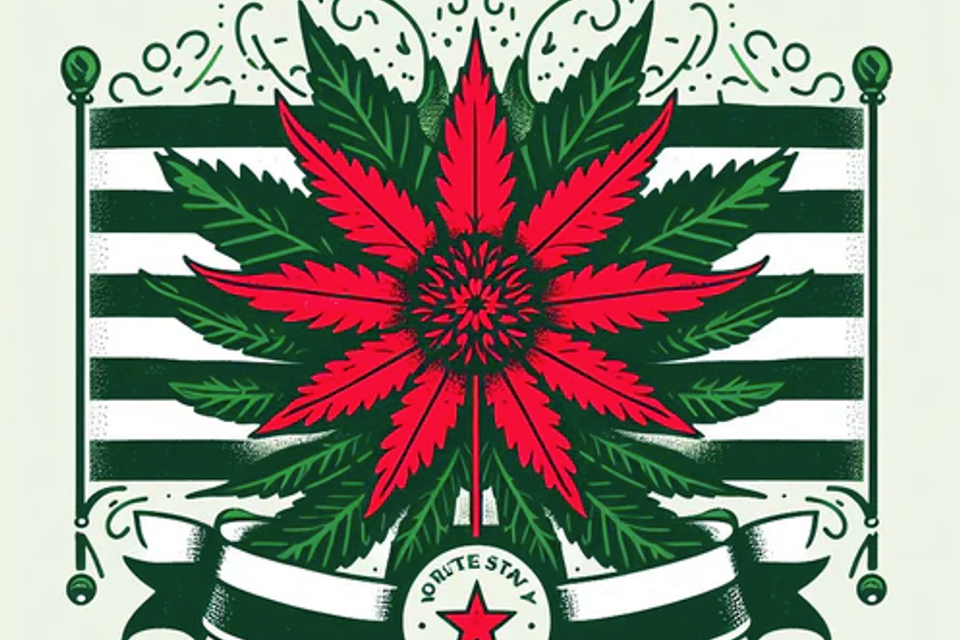
Have you ever found yourself wondering about the legal status of THCA in the United States? If so, you're not alone. With the cannabis industry rapidly evolving, it's crucial to stay informed about the laws governing various cannabinoids, including THCA.
First things first, let's break down what THCA actually is. Tetrahydrocannabinolic acid (THCA) is a non-psychoactive compound found in the raw cannabis plant. It's only when THCA is heated (like when smoking or vaping) that it converts into THC, the compound responsible for the 'high.' So, if you're curious about the buzz around THCA, it's worth noting that it's largely due to its non-intoxicating nature.
When it comes to the legality of THCA, it's a bit of a mixed bag across the United States. Federal law is clear on THC - it's a Schedule I controlled substance. However, THCA occupies a more ambiguous space. The complication arises from how it's derived and used, often leading to varied interpretations at the state level. To illustrate, some states where medical or recreational marijuana is legal may permit THCA, while others may not.
Picture this: It's late 2018, and the agricultural landscape of the United States is about to change dramatically. This change is heralded by the passing of the 2018 Hemp Farm Bill, a pivotal moment in the history of American agriculture and cannabis industry. For those in the know, this legislation marked a turning point, but what exactly did it entail?
Let's dive into what the 2018 Hemp Farm Bill was all about. Prior to this bill, hemp was classified alongside marijuana as a Schedule I substance under federal law, heavily restricting its cultivation and use. However, the 2018 Hemp Farm Bill changed the game by removing hemp (defined as cannabis with less than 0.3% THC) from this classification. This meant that hemp could now be grown, processed, and sold as an agricultural commodity. This shift not only opened doors for farmers but also sparked a surge in CBD product popularity.
The economic implications of this bill were enormous. Suddenly, farmers across the country were presented with a lucrative new crop option. The cultivation of hemp promised a new revenue stream, especially in areas hit hard by challenges in traditional farming sectors. For businesses, the legalization of hemp meant an influx of raw materials for a wide range of products, from textiles to health supplements, fueling a boom in the hemp-derived product market.
With the legalization of hemp, new regulatory frameworks were established. States were required to devise their own hemp cultivation plans, approved by the USDA, to regulate this burgeoning industry. This included provisions for licensing, testing, and ensuring that hemp crops did not exceed the THC threshold. For many, navigating these new regulations required a steep learning curve and adaptation to ensure compliance.
One often-discussed benefit of the 2018 Hemp Farm Bill was its environmental impact. Hemp is lauded for its sustainability - it requires less water and pesticides compared to traditional crops like cotton, and its cultivation can improve soil health. This aspect of the bill was seen as a step towards more sustainable agricultural practices, aligning with growing environmental concerns.
Since its passing, the 2018 Hemp Farm Bill has set the stage for ongoing developments in the hemp and cannabis industries. Its long-term impacts are still unfolding, with continuous adaptations in regulatory practices and market dynamics. This legislation not only reshaped the agricultural landscape but also paved the way for future legal considerations regarding cannabis.
The 2018 Hemp Farm Bill was more than just a piece of legislation; it was a catalyst for change across multiple sectors. Whether you're a farmer, business owner, environmentalist, or simply a curious observer, the effects of this bill have likely touched an aspect of your life, directly or indirectly. As we move forward, it will be interesting to observe how this foundational bill continues to influence the hemp industry and beyond.
Now, let's dive into the specifics. Here’s a quick rundown of states where THCA is allowed, either explicitly or by implication through broader cannabis laws:
Let's delve into a more detailed state-by-state analysis:
California:
In the Golden State, THCA is fully legal within the comprehensive cannabis regulatory framework. Thanks to progressive marijuana laws, residents have access to a variety of THCA products, from raw flowers to extracts.
Colorado:
Known for its pioneering role in legalizing cannabis, Colorado also permits the use of THCA. The state’s well-established marijuana industry offers numerous THCA options for both recreational and medicinal purposes.
Oregon:
Here, THCA is legal and available within the state's liberal cannabis guidelines. Oregon's approach to cannabis regulation means that THCA products are readily accessible to those seeking them.
Washington:
Like its West Coast neighbors, Washington State has a permissive stance on THCA. The state's legal framework for marijuana includes provisions for THCA, making it a hub for cannabis innovation and product availability.
Massachusetts:
In Massachusetts, where cannabis is legal for both medical and recreational use, THCA also finds its place. The state’s dispensaries often carry a range of THCA products, catering to a growing consumer base.
Michigan:
Michigan’s cannabis laws encompass THCA, allowing its use under the state’s marijuana regulations. The burgeoning cannabis market here includes a variety of THCA products for consumers.
Nevada:
In Nevada, particularly in areas like Las Vegas, THCA is legal as part of the state’s recreational and medical marijuana laws. This has led to a vibrant market for THCA products, especially among tourists.
Alaska:
Despite its remote location, Alaska’s cannabis laws are quite progressive, including THCA. Alaskans have access to THCA products through various licensed dispensaries across the state.
It's important to note that this is not an exhaustive list, and the legal status of THCA can change as new legislation is introduced. Additionally, even in states where THCA is legal, regulations regarding its production, sale, and use can vary significantly. Always check the most current state laws and consult with legal experts for the most accurate information.
(Note: This list is not exhaustive and is subject to change as laws evolve.)
It's essential to recognize the gray areas in THCA legality. The compound's non-psychoactive status does not automatically make it legal everywhere. State laws can be intricate, and sometimes, federal and state regulations clash. It's recommended to consult local laws and legal advisors for the most accurate information.
What sets Grateful Bud apart is their commitment to quality and customer service. Each product is carefully selected and tested to ensure purity and potency, giving you peace of mind about what you're purchasing. Plus, their responsive customer service team is always ready to assist you with any questions or concerns, making your shopping experience as smooth as possible.
While online shopping offers convenience, some may prefer the experience of visiting a dispensary or local shop. This allows you to see and learn about different THCA products firsthand and get immediate answers to your questions from knowledgeable staff. However, availability may vary based on your location and local regulations, so it's important to check your local laws and find a reputable store.
Regardless of where you choose to buy your THCA, it's crucial to ensure that you're getting a quality product from a reliable source. Look for shops and online platforms that provide transparent information about their products, including lab test results and sourcing details. This is especially important given the varying legal landscape of cannabis products across states.
While there are several options to purchase THCA, buying online from Grateful Bud offers an unmatched blend of convenience, quality, and customer service. Remember, always stay informed and choose a source that aligns with your needs and legal regulations in your area.
Is THCA legal federally?
It remains in a legal gray area due to its association with THC.
Can I travel across state lines with THCA products?
This is risky due to varying state laws and federal regulations.
Are there any health risks associated with THCA?
Research is ongoing, but always consult a healthcare professional before use.
Can I purchase THCA products online?
It depends on the laws in your state and the source of the products.
Does THCA show up on drug tests?
Generally, THCA itself does not, but its conversion to THC might.
Understanding THCA: A Brief Overview
First things first, let's break down what THCA actually is. Tetrahydrocannabinolic acid (THCA) is a non-psychoactive compound found in the raw cannabis plant. It's only when THCA is heated (like when smoking or vaping) that it converts into THC, the compound responsible for the 'high.' So, if you're curious about the buzz around THCA, it's worth noting that it's largely due to its non-intoxicating nature.
Navigating the Legal Landscape
When it comes to the legality of THCA, it's a bit of a mixed bag across the United States. Federal law is clear on THC - it's a Schedule I controlled substance. However, THCA occupies a more ambiguous space. The complication arises from how it's derived and used, often leading to varied interpretations at the state level. To illustrate, some states where medical or recreational marijuana is legal may permit THCA, while others may not.
A Game-Changing Year: The Impact of the 2018 Hemp Farm Bill
Picture this: It's late 2018, and the agricultural landscape of the United States is about to change dramatically. This change is heralded by the passing of the 2018 Hemp Farm Bill, a pivotal moment in the history of American agriculture and cannabis industry. For those in the know, this legislation marked a turning point, but what exactly did it entail?
Understanding the Bill: What Did It Change?
Let's dive into what the 2018 Hemp Farm Bill was all about. Prior to this bill, hemp was classified alongside marijuana as a Schedule I substance under federal law, heavily restricting its cultivation and use. However, the 2018 Hemp Farm Bill changed the game by removing hemp (defined as cannabis with less than 0.3% THC) from this classification. This meant that hemp could now be grown, processed, and sold as an agricultural commodity. This shift not only opened doors for farmers but also sparked a surge in CBD product popularity.
The Economic Ripple Effect: A Boon for Farmers and Businesses
The economic implications of this bill were enormous. Suddenly, farmers across the country were presented with a lucrative new crop option. The cultivation of hemp promised a new revenue stream, especially in areas hit hard by challenges in traditional farming sectors. For businesses, the legalization of hemp meant an influx of raw materials for a wide range of products, from textiles to health supplements, fueling a boom in the hemp-derived product market.
Regulation and Compliance: Navigating the New Norms
With the legalization of hemp, new regulatory frameworks were established. States were required to devise their own hemp cultivation plans, approved by the USDA, to regulate this burgeoning industry. This included provisions for licensing, testing, and ensuring that hemp crops did not exceed the THC threshold. For many, navigating these new regulations required a steep learning curve and adaptation to ensure compliance.
Environmental Impact: A Greener Alternative?
One often-discussed benefit of the 2018 Hemp Farm Bill was its environmental impact. Hemp is lauded for its sustainability - it requires less water and pesticides compared to traditional crops like cotton, and its cultivation can improve soil health. This aspect of the bill was seen as a step towards more sustainable agricultural practices, aligning with growing environmental concerns.
Looking to the Future: The Long-Term Impacts
Since its passing, the 2018 Hemp Farm Bill has set the stage for ongoing developments in the hemp and cannabis industries. Its long-term impacts are still unfolding, with continuous adaptations in regulatory practices and market dynamics. This legislation not only reshaped the agricultural landscape but also paved the way for future legal considerations regarding cannabis.
The 2018 Hemp Farm Bill was more than just a piece of legislation; it was a catalyst for change across multiple sectors. Whether you're a farmer, business owner, environmentalist, or simply a curious observer, the effects of this bill have likely touched an aspect of your life, directly or indirectly. As we move forward, it will be interesting to observe how this foundational bill continues to influence the hemp industry and beyond.
State-By-State Breakdown: Where THCA Stands
Now, let's dive into the specifics. Here’s a quick rundown of states where THCA is allowed, either explicitly or by implication through broader cannabis laws:
- California: Fully legal within the state's cannabis regulatory framework.
- Colorado: Permitted under the state's marijuana laws.
- Oregon: Legal within the state's cannabis guidelines.
Let's delve into a more detailed state-by-state analysis:
California:
In the Golden State, THCA is fully legal within the comprehensive cannabis regulatory framework. Thanks to progressive marijuana laws, residents have access to a variety of THCA products, from raw flowers to extracts.
Colorado:
Known for its pioneering role in legalizing cannabis, Colorado also permits the use of THCA. The state’s well-established marijuana industry offers numerous THCA options for both recreational and medicinal purposes.
Oregon:
Here, THCA is legal and available within the state's liberal cannabis guidelines. Oregon's approach to cannabis regulation means that THCA products are readily accessible to those seeking them.
Washington:
Like its West Coast neighbors, Washington State has a permissive stance on THCA. The state's legal framework for marijuana includes provisions for THCA, making it a hub for cannabis innovation and product availability.
Massachusetts:
In Massachusetts, where cannabis is legal for both medical and recreational use, THCA also finds its place. The state’s dispensaries often carry a range of THCA products, catering to a growing consumer base.
Michigan:
Michigan’s cannabis laws encompass THCA, allowing its use under the state’s marijuana regulations. The burgeoning cannabis market here includes a variety of THCA products for consumers.
Nevada:
In Nevada, particularly in areas like Las Vegas, THCA is legal as part of the state’s recreational and medical marijuana laws. This has led to a vibrant market for THCA products, especially among tourists.
Alaska:
Despite its remote location, Alaska’s cannabis laws are quite progressive, including THCA. Alaskans have access to THCA products through various licensed dispensaries across the state.
It's important to note that this is not an exhaustive list, and the legal status of THCA can change as new legislation is introduced. Additionally, even in states where THCA is legal, regulations regarding its production, sale, and use can vary significantly. Always check the most current state laws and consult with legal experts for the most accurate information.
(Note: This list is not exhaustive and is subject to change as laws evolve.)
The Gray Areas: Legal Nuances and Challenges
It's essential to recognize the gray areas in THCA legality. The compound's non-psychoactive status does not automatically make it legal everywhere. State laws can be intricate, and sometimes, federal and state regulations clash. It's recommended to consult local laws and legal advisors for the most accurate information.
Grateful Bud has emerged as a leader in the online cannabis market, particularly for those looking to purchase THCA products. They offer a wide range of options, from THCA flower to concentrates, catering to different preferences and needs. Their user-friendly website makes the shopping experience seamless, allowing you to browse and purchase from the comfort of your home.
What sets Grateful Bud apart is their commitment to quality and customer service. Each product is carefully selected and tested to ensure purity and potency, giving you peace of mind about what you're purchasing. Plus, their responsive customer service team is always ready to assist you with any questions or concerns, making your shopping experience as smooth as possible.
Other Avenues: Dispensaries and Local Shops
While online shopping offers convenience, some may prefer the experience of visiting a dispensary or local shop. This allows you to see and learn about different THCA products firsthand and get immediate answers to your questions from knowledgeable staff. However, availability may vary based on your location and local regulations, so it's important to check your local laws and find a reputable store.
Making an Informed Choice
Regardless of where you choose to buy your THCA, it's crucial to ensure that you're getting a quality product from a reliable source. Look for shops and online platforms that provide transparent information about their products, including lab test results and sourcing details. This is especially important given the varying legal landscape of cannabis products across states.
While there are several options to purchase THCA, buying online from Grateful Bud offers an unmatched blend of convenience, quality, and customer service. Remember, always stay informed and choose a source that aligns with your needs and legal regulations in your area.
FAQs on THCA Legality
Is THCA legal federally?
It remains in a legal gray area due to its association with THC.
Can I travel across state lines with THCA products?
This is risky due to varying state laws and federal regulations.
Are there any health risks associated with THCA?
Research is ongoing, but always consult a healthcare professional before use.
Can I purchase THCA products online?
It depends on the laws in your state and the source of the products.
Does THCA show up on drug tests?
Generally, THCA itself does not, but its conversion to THC might.


